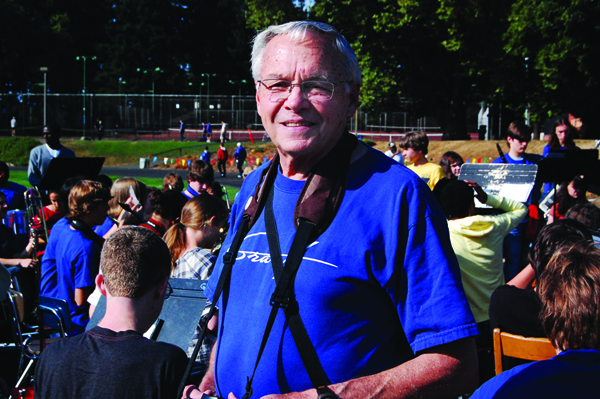During Ray Tate’s childhood, he was forced to leave the reservation in Northern Arizona where he grew up and attend a government-sponsored boarding school. He saw his parents only a few times a year. He wasn’t allowed to speak his native Navajo language in any class. And he was forced to learn English, while being deprived by teachers of any hint of his Native American heritage. That was his reality.
Tate, now a math teacher at Grant, experienced times when he wasn’t supposed to be who he wanted to be. He endured years of hardship and emotional struggles. Yet with parental support and his own determination to hold onto his faith and traditions, Tate has been able to preserve his traditions with his own family and grow despite his harsh past
Tate is a rarity. Not many of those who grew up where he was raised have achieved the level of accomplishment and scholarship that he’s seen. Out of eight siblings, Tate and three others have been to college and received degrees. “We are a rare family,” Tate explains.
Tate knows many people who he went to school with who still live there, some of them not of successful circumstances. This pushes the stereotype of a Native American reservation as a place with small, dense communities, social troubles and people suffering from alcoholism.
Yet, Tate says that this isn’t always the reality on a reservation. Like anywhere in the U.S., there are people who have problems, drinking in alleyways.
“I grew up and saw people like that,” Tate says now. “I had family that was like that.”
Tate’s education experience wasn’t like what students see at Grant. It was strict. Though he was Navajo, he was also a Christian. So he was separated from many of his peers when the students split up by faith. He didn’t get the chance to speak his native language or be exposed to the teachings of his heritage. He lost the opportunity to learn the same stories, songs and teachings.
“Many of us are trying to get those teachings back,” Tate says.
Although the building and learning facilities were modern, the quality of learning and the emotional abuse on some students, especially Tate, made his years in boarding school miserable.
Tate’s family has always been different. His parents pushed education.
“Our parents told us to go to school everyday; we had perfect attendance,” Tate remembers. Many other students did not have the supportive parents that he had.
On Fridays in elementary and middle school, students would get picked up for the weekend, returning to school on Monday. Many students wouldn’t get picked up until Saturday morning, though, and sometimes not for the entire weekend.
Dorm life in boarding school was harsh. “It was like the military,” he says. “In role call, we had to line up alphabetically.”
Students had to make their beds crisp and neat, sweep floors and live in the general manner of “speak when spoken to.” Tate had immense anxiety on Sundays for the week of school ahead. “I hated it,” he says.
In the dorms, there was one adult for every 50 students. This lack of an authoritative presence created opportunities for students to do what they wanted to each other and get away with it. “Kids would pick on me”, Tate remembers. “They would name call, and gang up on kids.”
Many appointed themselves leaders and ordered peers around. “The society in the dorms was either, be strong and take care of yourself, be weak, or be friends with the strong,” says Tate.
At age six, the adults taught them how to take a shower. “It was humiliating,” he remembers. And it made him not want to go back. “It scarred me,” he says.
Amongst the discomfort of school and dorm life, there was some hope for Tate. That hope came from Jimmy Black, who was his football coach and math teacher. He was also the only instructor at the school who was Navajo.
“The seed was planted when Mr. Black introduced algebra to us,” Tate said. “Math was a survival tool for me.”
In high school, many things changed. Tate couldn’t go home every weekend. “We could only go home four times a year – Thanksgiving, Christmas, spring and summer break,” he says.
The school was 300 miles away.
“They were trying to pull us away from the Navajo way of life,” Tate says.
With students so far away from home, they began to assimilate into American culture. Without parents to turn to when things got bad, Tate and many others had to start figuring out problems on their own. “We learned how to deal with personal issues like relationships,” he says now.
Because he no longer had anyone else to get him out of situations, he looked inward. That’s when he became more quiet in nature and developed a serious side.
“The inner strength helped me a lot,” Tate says.
It didn’t always help him, though. He went to Arizona State University, but dropped out after a year. His partying got in the way of him going to class.
He spent several years working as an auto technician. He did construction work. And he broke his leg after getting hit by a car. One of his sisters convinced him to come for Portland. Maybe he could find a job here where she lived. Besides, there was a woman she wanted him to meet. Her name was Tru Love.
Love’s sister and Tate’s sister were friends. When Love’s family had a barbecue, Tate attended. The two had a strong connection because she shared his love of faith and was interested in his culture.
“It meant a lot to find someone with the same beliefs and values,” Tru Tate recalls.
They married in 1995 and now have three kids: Lael, 13; Toli, 11; and Aanii, 9.
Meanwhile, Tate started deviating from his interest in math, looking into a career as an engineer or a counselor. But a professor in the math department at Portland State University encouraged him to return to his old academic love. There weren’t any Native Americans in the department, he was told.
He picked it up as a major and began to explore it in ways he hadn’t done before. “Some people write, play music or are into reading,” Tate says. “Math was my passion.”
He spent so much time immersed in math that he would talk about the subject in conversations with his friends. He’d use conversations to help him solve math problems.
“I still didn’t think I was going to teach math,” Tate admits. But because of his expertise, he was accepted and soon received a degree in mathematics.
Now, Tate balances the sternness and compassion that he has gained throughout his life, and makes sure to exercise both qualities in and out of the classroom. “Because if I don’t balance those, I’m not doing a good job,” he says.
At home, he works to preserve his traditions with his family. He teaches his daughters Navajo and also shows them the traditional songs he learned as a child. “I make songs and sing for them, like drum songs,” he says.
Tate’s daughters love the songs and sing them with joy. “It feels cool to sing in Navajo,” Tru Tate says.
He tells them stories – “the reasons of why something is” – that have been passed down to him for generations. “My wife encourages me,” he says. “She wishes I could do more.”
Tru Tate knows the importance of making sure their daughters learn and retain Navajo traditions and language because it will help them become strong in adulthood and they can pass it on to another generation. “My hope is for them to know it,” she says. “A lot of people don’t have culture. I love that the kids get that.”
Often, when Tate speaks in English to his daughters, they don’t pay attention.
“But when I speak in Navajo, they get in tune to what I am saying and try to figure it out,” Tate says.
Tate has given his daughters Navajo names. He takes them to the reservation a couple times a year for certain Navajo ceremonies and to see his parents and grandmother.
In Portland, they’ve been in their house for about nine years. But Tate and his family have avoided fully assimilating into American culture in one way – until now, that is: Tate and his wife got their first cell phones a few weeks ago. “We just never felt a need for them,” Tate explains.
They decided to get them because they found themselves depending on other people’s phones to call each other. Although he has had it for more than a couple weeks, Tate only has two contacts, one of them, his wife’s number. “No one in the world knows my number,” he jokes.
The three girls share a phone but do not use it often. No one in the family has an iPod and the phones aren’t set up for texting.
“They enjoy electronics when they need them,” Tate explains.
For years, Tru Tate home schooled the girls, but last year they decided to put them in public school. The girls say they are well-accepted and fit in at school. In fact, they’ve given presentations about their Navajo culture and are proud of them.
Although Tate sometimes wonders what it would be like to be teaching in the schools on the reservation, he knows that he’s built a strong foundation at Grant where he’s taught for seven years.
Fellow math teacher Pat Herrington has formed a relationship with Tate and his family. She admires the way he sits down with his students to help them when they are struggling. “He has a peaceful quietness about him in the class room,” says Herrington.
English teacher Russell Peterson has invited Tate into his classroom many times to talk about his past.
“He doesn’t talk to just hear his own voice,” Peterson explains. “When he speaks, it would be a good thing to hear what he has to say. It’s worth listening to.”




























